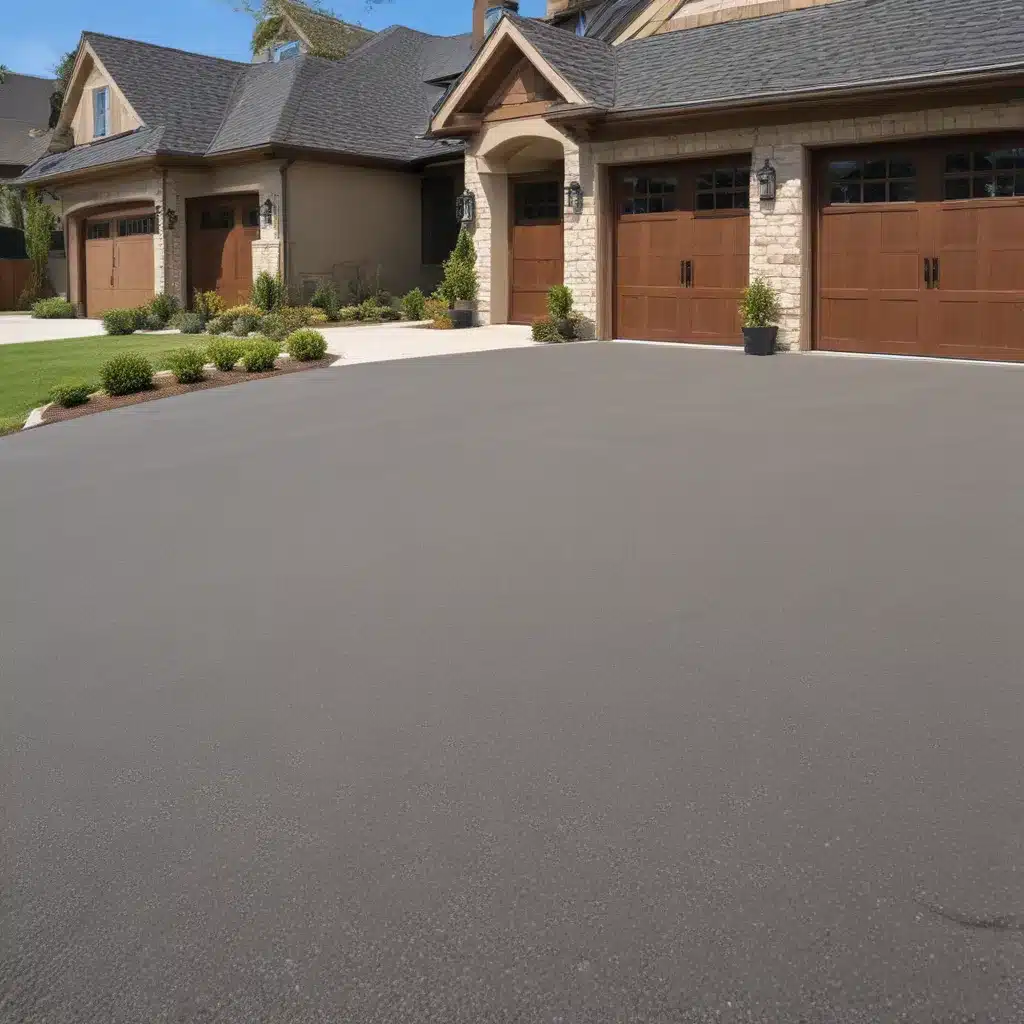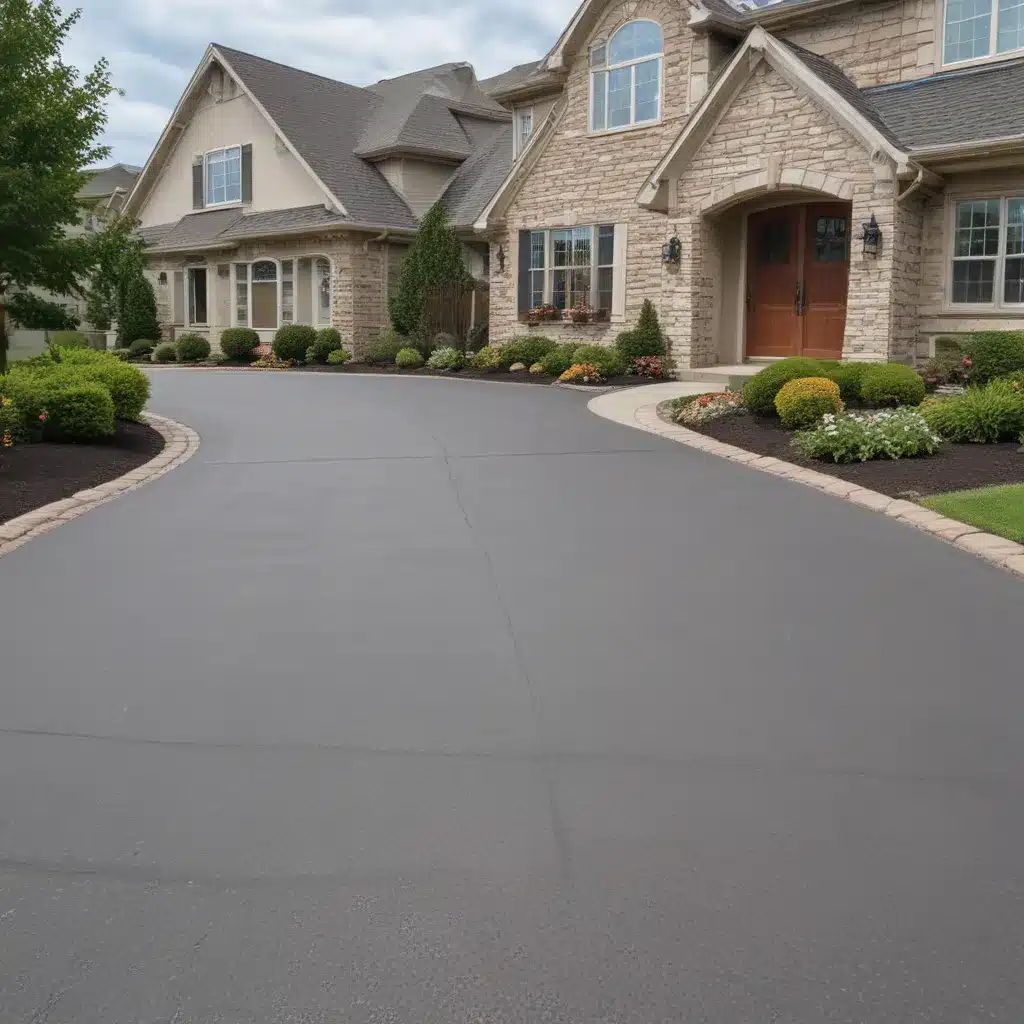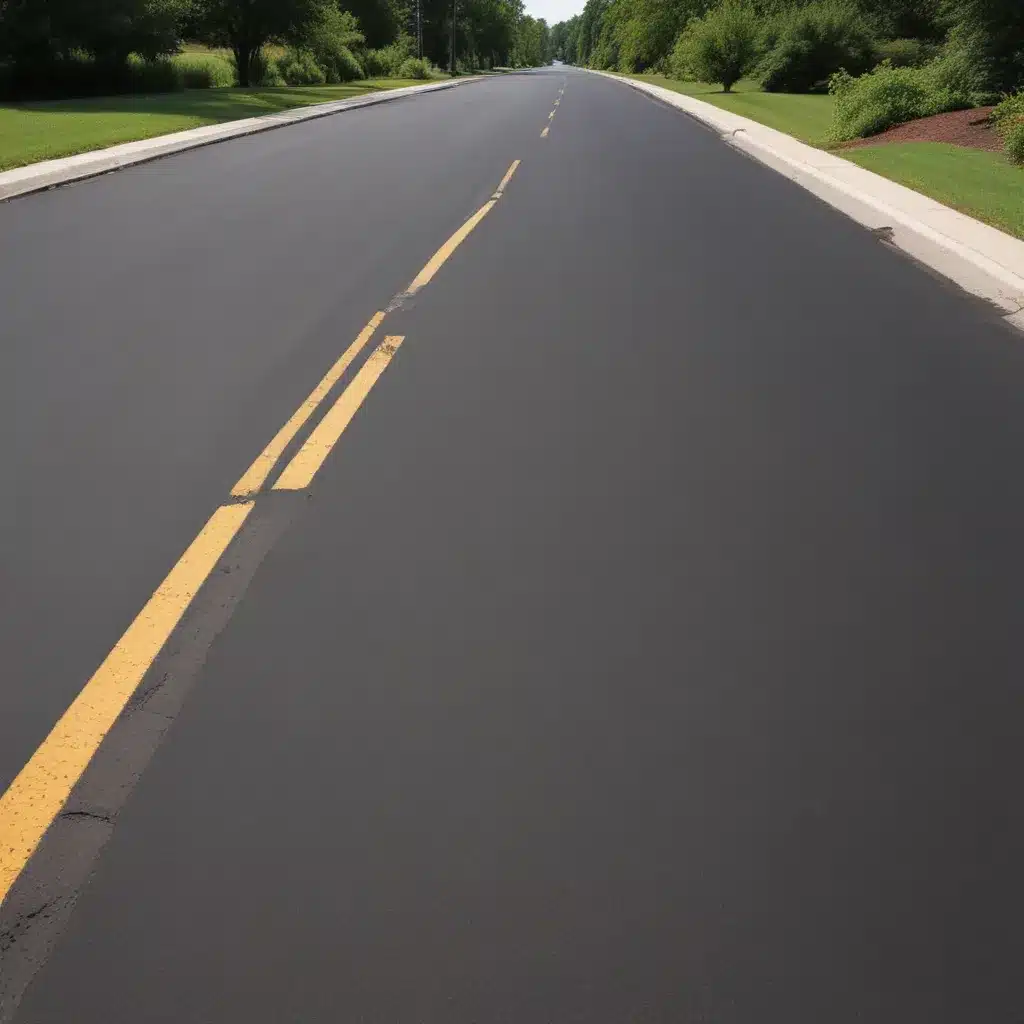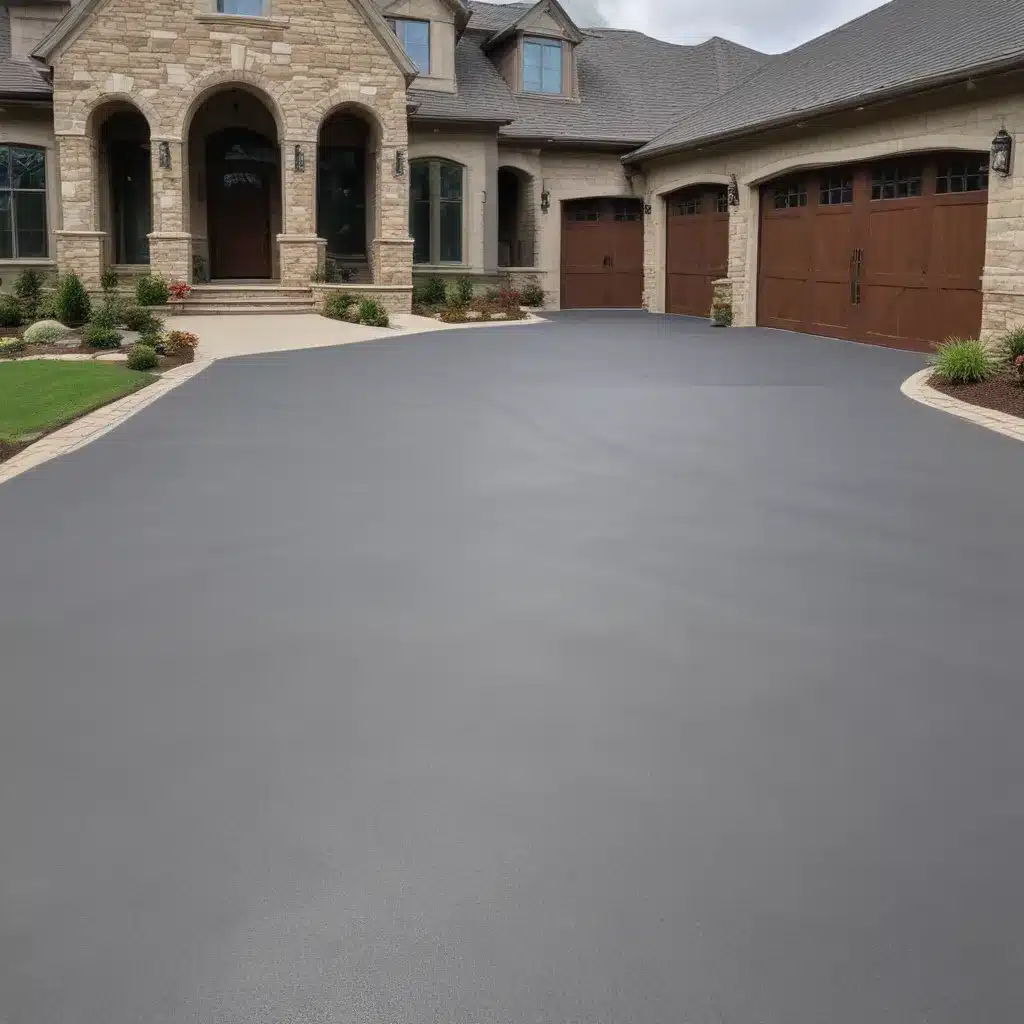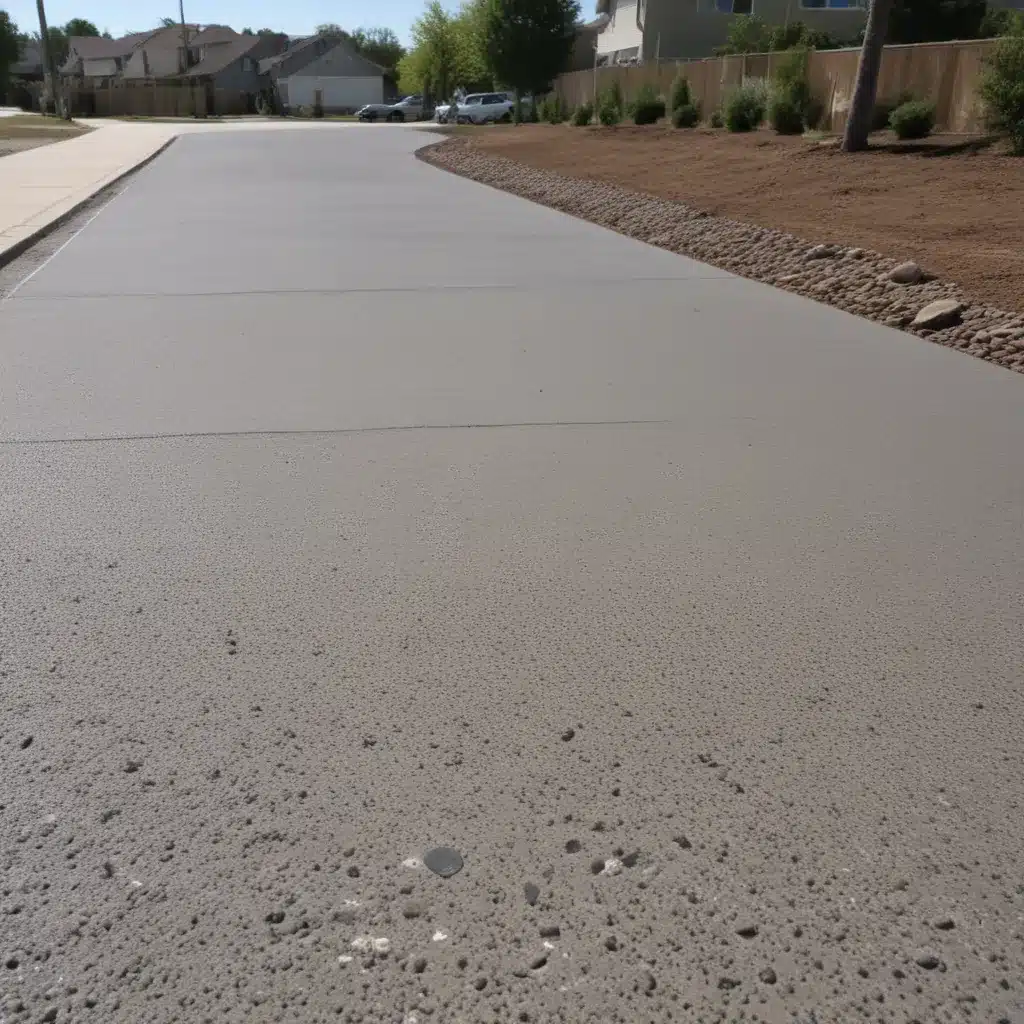The Plight of Traditional Driveways
As the world becomes increasingly conscious of its environmental impact, the humble driveway has found itself under the microscope. Traditional driveways, often made of asphalt or concrete, have long been the go-to choice for homeowners, but their environmental toll is no longer something we can ignore. These surfaces are not only energy-intensive to produce, but they also contribute to the urban heat island effect, exacerbating the challenges of climate change.
Imagine, if you will, a scorching summer day – the kind where the pavement seems to radiate heat, making you feel like you’re walking on the surface of the sun. That’s the reality for many neighborhoods with predominately paved driveways and roads. These dark, impermeable surfaces absorb and trap heat, creating a microclimate that is significantly warmer than the surrounding areas. This, in turn, increases the demand for air conditioning, driving up energy consumption and greenhouse gas emissions.
But the environmental impact of traditional driveways doesn’t stop there. The runoff from these surfaces can also contribute to the degradation of local water sources, as pollutants and chemicals from vehicles and the driveway materials themselves are washed away and into nearby streams, rivers, and groundwater. It’s a troubling cycle that, if left unchecked, could have dire consequences for the health of our planet.
Embracing Eco-Friendly Alternatives
Fortunately, there are a growing number of eco-friendly driveway options that can help reduce your carbon footprint and mitigate the negative impacts of traditional paved surfaces. These alternatives not only look great, but they also offer a host of benefits that go beyond just aesthetics.
Permeable Pavement
One of the most promising eco-friendly driveway solutions is permeable pavement. Unlike traditional concrete or asphalt, permeable pavement is designed to allow water to flow through the surface and into the ground below, rather than running off and potentially causing erosion or polluting nearby waterways.
This might sound like a simple concept, but the engineering behind permeable pavement is quite impressive. These surfaces are typically made from a combination of porous materials, such as porous concrete, porous pavers, or even gravel, that are arranged in a way that creates a network of small gaps and spaces. When it rains, the water is able to seep through these gaps and percolate into the soil, where it can be naturally filtered and replenish groundwater supplies.
Not only does this help reduce the strain on local stormwater infrastructure, but it also helps to recharge aquifers and prevent the buildup of pollutants in nearby bodies of water. And let’s not forget the cooling effect – permeable pavement can actually help to mitigate the urban heat island effect by allowing more water to evaporate, which has a natural cooling effect on the surrounding area.
Grass Pavers
Another eco-friendly driveway option that’s gaining popularity is grass pavers. These are essentially a type of permeable pavement, but with a twist – instead of being made entirely of porous materials, they incorporate spaces for grass or other low-growing vegetation to take root and thrive.
The result is a driveway that not only allows water to percolate into the ground, but also adds a touch of natural greenery to your outdoor space. Grass pavers can be a great choice for homeowners who want to maintain a lush, park-like aesthetic while also reducing their environmental impact.
But the benefits of grass pavers go beyond just aesthetics and water management. These surfaces can also help to improve air quality by sequestering carbon and releasing oxygen through the growing plants. And let’s not forget the insulating properties of the soil and vegetation, which can help to regulate temperature and reduce the urban heat island effect.
Gravel Driveways
If you’re looking for a more rustic, natural-looking driveway option, a gravel driveway might be just the ticket. These surfaces are typically made from a combination of crushed stone, pebbles, and other natural aggregates, and they offer a number of environmental advantages over traditional paved driveways.
For starters, gravel is a highly permeable material, which means that water can easily flow through the surface and into the ground below. This helps to reduce the risk of flooding and erosion, and it also helps to recharge local groundwater supplies.
But the benefits of gravel driveways don’t stop there. These surfaces are also generally less energy-intensive to produce and install than traditional paved driveways, and they can be a more cost-effective option for homeowners as well.
And let’s not forget the aesthetic appeal of a gravel driveway. With their natural, rustic look and feel, these surfaces can be a great way to add a touch of charm and character to your outdoor space. Imagine pulling up to your home and being greeted by a winding gravel driveway, flanked by lush landscaping and maybe even a few whimsical garden gnomes (hey, we all need a little bit of whimsy in our lives, right?).
Comparing the Options
Now, I know what you might be thinking – “Okay, these eco-friendly driveway options sound great, but how do they stack up against traditional driveways in terms of practical considerations?” It’s a fair question, and one that deserves a thorough exploration.
| Driveway Option | Permeability | Maintenance | Cost | Aesthetic Appeal |
|---|---|---|---|---|
| Asphalt/Concrete | Low | Moderate to High | Moderate to High | Utilitarian |
| Permeable Pavement | High | Moderate | Moderate to High | Modern, Sleek |
| Grass Pavers | High | Moderate to High | Moderate to High | Natural, Lush |
| Gravel | High | Low | Low to Moderate | Rustic, Charming |
As you can see, each of these eco-friendly driveway options has its own unique set of pros and cons. Permeable pavement and grass pavers, for example, offer excellent water management capabilities and a modern, stylish aesthetic, but they may require a bit more maintenance than a traditional driveway. Gravel, on the other hand, is a low-maintenance, cost-effective option that can add a touch of rustic charm to your outdoor space.
Ultimately, the “best” eco-friendly driveway option will depend on your specific needs, budget, and personal preferences. Are you looking for a driveway that will reduce your environmental impact while also adding a touch of modern flair to your home? Permeable pavement might be the way to go. Or perhaps you’re more drawn to the natural, park-like look of a grass paver driveway. Whatever your preference, there’s an eco-friendly option out there that can help you reduce your carbon footprint and enjoy a beautiful, functional outdoor space.
Diving Deeper into Eco-Friendly Driveway Maintenance
Now, I know what you might be thinking – “Okay, these eco-friendly driveway options sound great, but what about the maintenance? Isn’t that going to be a huge hassle?” It’s a fair question, and one that deserves a closer look.
The truth is, eco-friendly driveways do require a bit more maintenance than their traditional counterparts. But the good news is that with a little bit of proactive care, you can keep your driveway looking and functioning its best for years to come.
Let’s start with permeable pavement. One of the key things to keep in mind with this type of driveway is that the porous surface can become clogged over time with dirt, debris, and even organic matter like leaves and twigs. To keep your permeable pavement functioning at its best, you’ll need to regularly sweep or vacuum the surface to remove any accumulated material. And every few years, you may need to have the driveway professionally cleaned and re-sealed to restore its permeability.
Grass pavers, on the other hand, require a bit more hands-on maintenance. In addition to regular sweeping and debris removal, you’ll also need to mow and water the grass just like you would with any other lawn. This can be a bit more time-consuming than a traditional driveway, but the rewards – a lush, park-like aesthetic and improved stormwater management – can be well worth the effort.
And what about gravel driveways? These might just be the low-maintenance champs of the eco-friendly driveway world. While you’ll still need to occasionally rake or replenish the gravel to maintain a smooth, level surface, the overall maintenance demands are relatively minimal compared to other options. Plus, gravel driveways are generally less susceptible to cracking, heaving, or other structural issues that can plague paved surfaces over time.
Of course, the specific maintenance requirements for any eco-friendly driveway will depend on a variety of factors, including the climate, the amount of traffic the driveway sees, and the specific materials used. But the key is to be proactive and stay on top of any necessary maintenance tasks. After all, a well-maintained eco-friendly driveway is not only better for the environment, but it can also add significant value and curb appeal to your home.
Real-World Examples and Inspiration
Now that we’ve explored the various eco-friendly driveway options and their maintenance requirements, let’s take a look at some real-world examples to get a better sense of how these solutions can be implemented.
One inspiring case study comes from the quaint town of Oakville, Ontario, where a homeowner decided to swap out their traditional asphalt driveway for a permeable paver system. The transformation was nothing short of remarkable – not only did the new driveway help to reduce the property’s stormwater runoff and urban heat island effect, but it also added a touch of modern elegance to the home’s overall aesthetic.
“We were really impressed with how the permeable pavers not only looked great, but also helped to manage the heavy rainfall we often experience in this area,” said the homeowner. “It’s been a game-changer for us in terms of reducing our environmental impact and creating a more comfortable outdoor living space.”
Another standout example comes from the suburbs of Seattle, where a family decided to go the grass paver route for their driveway renovation. The results were nothing short of stunning – a lush, verdant driveway that blended seamlessly with the home’s surrounding landscape.
“We wanted to create a driveway that felt more like a natural extension of our garden,” the homeowner explained. “The grass pavers have been a perfect solution, allowing us to maintain a beautiful, park-like aesthetic while also reducing our water usage and stormwater runoff.”
And let’s not forget the rustic charm of gravel driveways. In the quaint town of Asheville, North Carolina, a historic home recently underwent a driveway transformation, swapping out the cracked and worn asphalt for a winding gravel path.
“The gravel driveway just feels so much more in keeping with the character of our home,” the homeowner gushed. “It’s low-maintenance, cost-effective, and adds a lovely, naturalistic touch to our outdoor space. Plus, we’ve noticed a significant reduction in the amount of water runoff from our property, which is a huge bonus.”
These real-world examples are just a small sampling of the many ways that homeowners are embracing eco-friendly driveway solutions. Whether it’s permeable pavement, grass pavers, or gravel, the common thread is a commitment to reducing environmental impact and creating beautiful, functional outdoor spaces.
Conclusion: A Greener Future for Our Driveways
As we’ve explored in this article, the humble driveway is no longer just a utilitarian necessity – it’s a canvas for creative, eco-friendly solutions that can help us reduce our carbon footprint and create more sustainable communities.
From the sleek, modern aesthetic of permeable pavement to the lush, park-like charm of grass pavers, there’s an eco-friendly driveway option to suit every homeowner’s taste and needs. And let’s not forget the rustic appeal of gravel driveways, which offer a cost-effective and low-maintenance solution for those looking to add a touch of natural beauty to their outdoor space.
Of course, the decision to go the eco-friendly route with your driveway is not one to be taken lightly. There are considerations around maintenance, cost, and even personal preference that will factor into the equation. But as the examples we’ve explored have shown, the rewards – both environmental and aesthetic – can be truly transformative.
So, what are you waiting for? Take a good, hard look at your current driveway situation and start exploring the world of eco-friendly alternatives. Who knows, you might just discover a solution that not only reduces your carbon footprint, but also adds a touch of charm and character to your outdoor space. After all, when it comes to creating a greener, more sustainable future, every little bit counts – even when it comes to the humble driveway.

